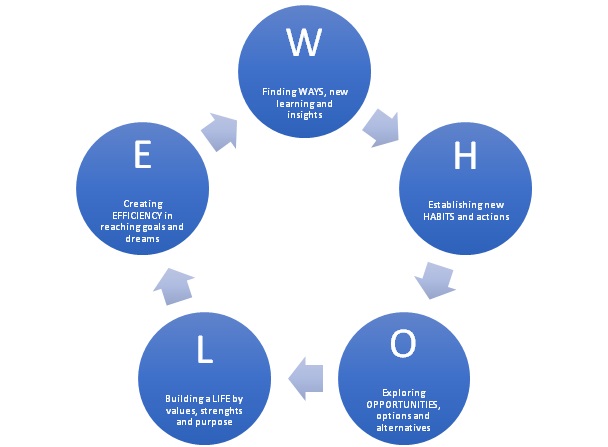A Coaching Model Created by Emanuela Maria Elly Goerick
(Life Coach, SWITZERLAND)
Welcome to my coaching model. Let`s experience the wholeness of life!
My coaching model evolves around the word “WHOLE”. What does that mean?
It means:
I chose a model that does not clarify a specific topic or niche (the “what”), but rather explains my philosophy in coaching (the “how”). The aspects mentioned below can refer to a variety of life topics and coaching needs. The Circle of Wholenessdemonstrates the continuity of the process. While my coaching will start with creating an agreement on a specific goal, the circle demonstrates that my coaching is a journey that is led by the client. Every step of the coaching process is linked to other steps, insights, and actions. It is a round circle that empowers change and self-growth. A coaching goal can be reached at any stage, depending on the client`s definition. The self-reinforcing nature of a circle represents the idea that reaching a goal can mean that new aspirations come up. In such a case, the circle can start anew at any step and the journey of wholeness will continue into another dimension that is not yet imaginable.
W – Finding WAYS, new learning, and insights
H – Establishingnew HABITS and actions
O – Exploring OPPORTUNITIES, options, and alternatives
L – Building a LIFE by values, strengths, and purpose
E – Creating EFFICIENCY in reaching goals and dreams
Finding WAYS, new learning, and insights.
My coaching will support the creation of awareness. It will help a client finding ways that we recovered with leaves or branches. It will open up ways towards desired outcomes. Insightsandnewlearningwill help to find these ways and for these ways to be self-validating rather than approval-seeking
Establishing new HABITS and actions.
My coaching will revolve around motivating action and creating new supportive habits. The reason why I chose the word habits that I believe a goal can best be reached through repetitive actions that support the goal. As neuroscience has shown, what we do for a period of three weeks, will persist as an acquired behavior pattern that will become almost involuntary[1].
Exploring OPPORTUNITIES, options, and alternatives.
My coaching will encourage the exploration of opportunities. We will think big and explore possible options and alternatives. In the safe space of my coaching, my client will bed river of seeking new possible opportunities. Options that might have been disregarded in the past, we will be openly discussed. The alternative path so factions, their benefits, and possibilities will be thoroughly analyzed.[2]
Building a LIFE by values, strengths, and purpose.
In my coaching, we will identify my client’s values, strengths, and deeper life motivations. Building and pursuing life goals that are congruent with my client`s inherent values, strengths, and purpose will ensure that reaching these goals increase happiness and life contentment. We will reverse approval-seeking behavior patterns and instead focus on actions that are allowing my client to live and express the deeper values and motivations. We will focus on my client`s strengths as this will foster self grow than development.[3]
Creating EFFICIENCY in reaching goals and dreams.
All of the above-mentioned stages and steps would not work without creating the right environment for fast, efficient results. In my coaching, I will ensure to keep my client on track, fostering effective actions, and fast learning and outcomes. Options that were tried and are not working will bed dropped immediately and attention, focus, and energy directed towards the efficient reaching of goals, and dreams. In my coaching, I will only apply science-based models and frameworks and will continue to grow my own knowledge about the latest social science research and findings. Efficiency is an obligation and a promise to all my future clients!

Resources
[1]link: https://thesystemsthinker.com/the-neuroscience-of-new-habits/)
[2]Whitemore, J. (2009). Coaching for performance: GROWing human potential and purpose: the principles and practice of coaching and leadership. People skills for professionals (4th ed.). Boston: Nicholas Brealey.
[3]Link: https://www.psychologytoday.com/us/blog/functioning-flourishing/201411/ten-reasons-focus-your-strengths